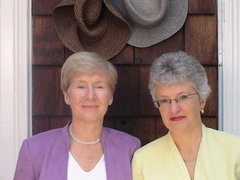Background
 Ann Louise Gilligan and Katherine ZapponeMarriage equality is about giving equal rights to marriage for lesbian and gay couples on the basis that lesbian and gay people and heterosexual people are equal in the law.
Ann Louise Gilligan and Katherine ZapponeMarriage equality is about giving equal rights to marriage for lesbian and gay couples on the basis that lesbian and gay people and heterosexual people are equal in the law.
MarriagEquality grew out of an initiative introduced to support the case of Katherine Zappone and Ann Louise Gilligan to have their Canadian marriage recognised in Ireland. MarriagEquality argues that lesbians and gay men should have the right to marry, in a civil registry office, and gain the same legal rights associated with marriage for themselves and their families.
Dr. Katherine Zappone and Dr. Ann Louise Gilligan are both women and Irish citizens. They live in Ireland . Dr. Zappone is a public policy research consultant and member of the Human Rights Commission. Dr. Gilligan is an academic and works as a lecturer at St. Patrick's College, Dublin. They have lived together as a de facto couple for 25 years, and are both salaried income earners and joint owners of a family home and one other property in Ireland.
In April, 2001 Katherine and Ann Louise decided to seek legal recognition of their life partnership. As at present, no such legal recognition existed in the country and there was little public debate about partnership rights for same-sex couples. With extensive research and legal advice they were considering taking a constitutional challenge against the Irish State.
Another route opened up when a British Columbia High Court opened the Canadian institution of marriage to same sex couples in June of 2003. On 13 the September of that year they married in a civil ceremony in Vancouver, British Columbia, Canada. Their marriage is legally valid for all purposes in Canada.
On their return to Ireland, the couple wrote to the Revenue Commissioners (the Irish tax authorities) informing them of their marriage and seeking to claim the various tax allowances and advantages to which married couples are entitled in Ireland.
The Revenue Commissioners responded by informing the two women that they would not allow their claim for allowances. This decision was made on the basis that although the Taxes legislation does not define husband or wife, the Oxford English Dictionary defines 'husband' as a married man, and 'wife' as a married woman.
Katherine and Ann Louise wished to challenge this interpretation. They consulted their legal team (Phil O'Hehir of Brophy Solicitors, and their barristers Ivana Bacik BL and Gerard Hogan SC), who, in November 2004, brought proceedings on their behalf to the High Court, challenging the decision of the Revenue Commissioners not to recognise their Canadian marriage. This challenge was brought using the legal procedure of 'Judicial Review' - where the High Court has the power to review decisions of public bodies (like the Revenue Commissioners) if those decisions have been made in breach of constitutional rights.
It was argued before the High Court that Katherine and Ann Louise had a constitutional right to equality; a right to marry; property rights; and family rights under the constitutional protection of the family in Article 41. They argued that these rights had been breached by the failure of the Revenue Commissioners to recognise their marriage. They also argued that the failure to recognise their marriage breached their rights under the European Convention on Human Rights.
Leave (permission) to take the challenge was granted by the High Court (Mr. Justice McKechnie) on 8th November 2000. The first stage in the case had been successful.
Following a delay, the Government announced in April 2005 that it would contest the case on the basis of advice from the Attorney General that it would prevail. The case attracted media coverage in The Boston Globe and the couple were interviewed on the The Late Late Show.
The court case began on October 3, 2006 and concluded on October 13. Judgement was delivered on the 14th December, 2006. Ms. Justice Dunne found that although a 'living document', the Irish constitution had always meant for marriage to be between a man and a woman, that the definitions used in the Civil Registration Act of 2004 was an expression of the current attitudes of the state and that she could find no reason to change that. Further, she found that the constitution did not violate the plaintiffs rights under European law. The judgement did say, however, that the topic is very much in the news and that there were undoubtedly difficulties and hardships for same-sex and unmarried heterosexual couples and that
"It is to be hoped that the legislative changes to ameliorate these difficulties will not be long in coming. Ultimately, it is for the legislature to determine the extent to which such changes should be made."
On Feb 23, 2007 the case was appealed to the Supreme Court. There is no known timeframe for the Supreme Court Hearing.